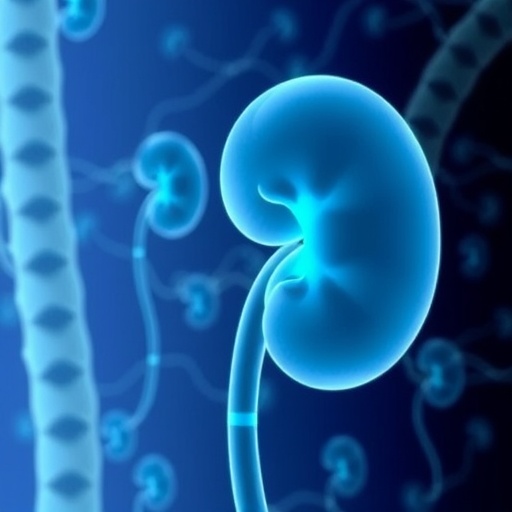In a groundbreaking new study published in BMC Cancer, researchers have unveiled the critical role of T-LAK cell-originated protein kinase (TOPK) in kidney renal clear cell carcinoma (KIRC), offering promising avenues for prognostic assessment and immunotherapeutic strategies. KIRC, the most common and lethal subtype of kidney cancer, has long challenged oncologists due to its complex tumor microenvironment and resistance to conventional therapies. This comprehensive investigation integrates bioinformatics, molecular biology, and in vivo experimental models to elucidate how TOPK not only drives tumor progression but also orchestrates immune suppression within the tumor microenvironment.
TOPK, a serine/threonine kinase initially identified in activated T lymphocytes, has gained increasing attention for its oncogenic functions across a wide spectrum of malignancies. However, its specific contribution to kidney cancer pathogenesis has remained elusive until now. This study bridges that gap by demonstrating a marked overexpression of TOPK in KIRC tissues compared to normal kidney counterparts. Intriguingly, this overexpression correlates with altered promoter methylation patterns, suggesting an epigenetic mechanism regulating TOPK expression that may be exploited for therapeutic intervention.
One of the most striking findings of the study is the independent prognostic value of TOPK expression in KIRC patients. Utilizing large-scale patient cohorts and robust statistical modeling, high TOPK levels emerged as a predictor of poor overall survival, emphasizing its clinical relevance. Unlike traditional biomarkers that often fail to capture the dynamic tumor-host interplay, TOPK reflects a molecular nexus influencing not only tumor cell behavior but also the immune landscape, a feature critical for precision oncology.
.adsslot_OnRjASU37s{width:728px !important;height:90px !important;}
@media(max-width:1199px){ .adsslot_OnRjASU37s{width:468px !important;height:60px !important;}
}
@media(max-width:767px){ .adsslot_OnRjASU37s{width:320px !important;height:50px !important;}
}
ADVERTISEMENT
Delving deeper into the tumor immunology context, the investigators employed state-of-the-art computational tools to dissect immune cell infiltration patterns in KIRC tumors with varying levels of TOPK expression. High TOPK expression was associated with a conspicuous depletion of cytotoxic immune effectors such as CD8+ T cells and natural killer (NK) cells. Concomitantly, these tumors exhibited elevated expression of immune checkpoint molecules, including PD-L1 and CTLA-4, which are known to dampen anti-tumor immunity. This dual effect suggests that TOPK actively contributes to establishing an immunosuppressive microenvironment that enables tumor cells to evade immune surveillance.
To unravel the signaling cascades downstream of TOPK, the researchers performed functional enrichment and pathway analyses, revealing its association with key inflammatory and oncogenic pathways. Notably, TOPK interlinks with NOTCH1 signaling, a pathway implicated in vascular remodeling and tumor growth; TNF-α, a pleiotropic cytokine that shapes inflammatory responses; and TGF-β signaling, recognized for its immunosuppressive and pro-fibrotic roles within tumors. This multifaceted involvement highlights TOPK as a central orchestrator of tumor-promoting inflammation and immune escape mechanisms.
In an innovative translational approach, the research team harnessed in vivo tumor models deficient in TOPK expression to validate its role under physiological immune conditions. Although the primary models were non-renal in origin, the immunocompetent mouse systems provided compelling evidence that loss of TOPK alters tumor-associated inflammatory profiles. Specifically, TOPK-deficient tumors exhibited changes consistent with diminished immunosuppression, offering a rationale for therapeutic targeting of TOPK to reinvigorate anti-tumor immunity.
The capacity of TOPK to modulate immune checkpoints and cytotoxic lymphocyte infiltration positions it as a prime candidate for combination therapies integrating kinase inhibitors with immune checkpoint blockade. This is particularly significant given the current clinical challenges in treating KIRC, where durable responses to immunotherapy remain limited. Inhibiting TOPK activity could potentially sensitize tumors to immune-mediated destruction, overcoming resistance and improving patient outcomes.
This multidisciplinary study not only highlights the prognostic significance of TOPK but also illuminates its instrumental role in reshaping the tumor microenvironment. By fostering an immunosuppressive milieu, TOPK facilitates tumor growth and metastasis, underscoring its potential as a molecular choke point in KIRC pathology. The use of comprehensive bioinformatics alongside experimental validation sets a new standard for uncovering clinically relevant molecular targets in complex cancers.
The implications extend beyond KIRC as well, given the pervasive role of TOPK in other malignancies. Insights into its immunomodulatory functions could spur broader therapeutic innovations across oncology. Moreover, elucidation of TOPK’s interactions with pivotal signaling pathways offers fertile ground for combination regimens aimed at multiple tumor-promoting axes simultaneously.
Future studies are warranted to develop selective TOPK inhibitors and assess their clinical efficacy both as monotherapy and in combination with existing immunotherapies such as PD-1/PD-L1 antibodies. Additionally, unraveling the precise molecular mechanisms through which TOPK interfaces with immune checkpoint regulation and inflammatory signaling will provide deeper insights into tumor immunobiology.
In conclusion, this study propounds TOPK as a novel prognostic biomarker and an actionable immunotherapeutic target in kidney renal clear cell carcinoma. Its dual role in driving tumor progression and subverting immune responses encapsulates the complexity of tumor biology that modern oncology strives to overcome. Targeting TOPK could herald a new era of more effective, personalized therapies tailored to dismantle the immunosuppressive barriers that guard KIRC tumors, ultimately improving patient survival and quality of life.
Subject of Research: The role of TOPK in immune suppression and prognosis in kidney renal clear cell carcinoma (KIRC).
Article Title: TOPK promotes immune suppression in kidney renal clear cell carcinoma and emerges as a prognostic and therapeutic target.
Article References:
Zheng, Z., Xiong, R., Sui, X. et al. TOPK promotes immune suppression in kidney renal clear cell carcinoma and emerges as a prognostic and therapeutic target. BMC Cancer 25, 1334 (2025). https://doi.org/10.1186/s12885-025-14665-0
Image Credits: Scienmag.com
DOI: https://doi.org/10.1186/s12885-025-14665-0
Tags: bioinformatics in cancer studiesepigenetic regulation of TOPKimmune suppression in KIRCimmunotherapeutic strategies for KIRCkidney renal clear cell carcinoma researchmolecular biology in canceroncogenic functions of TOPKprognostic value of TOPKT-LAK cell-originated protein kinaseTOPK in kidney cancertumor microenvironment in renal cancertumor progression in kidney cancer





